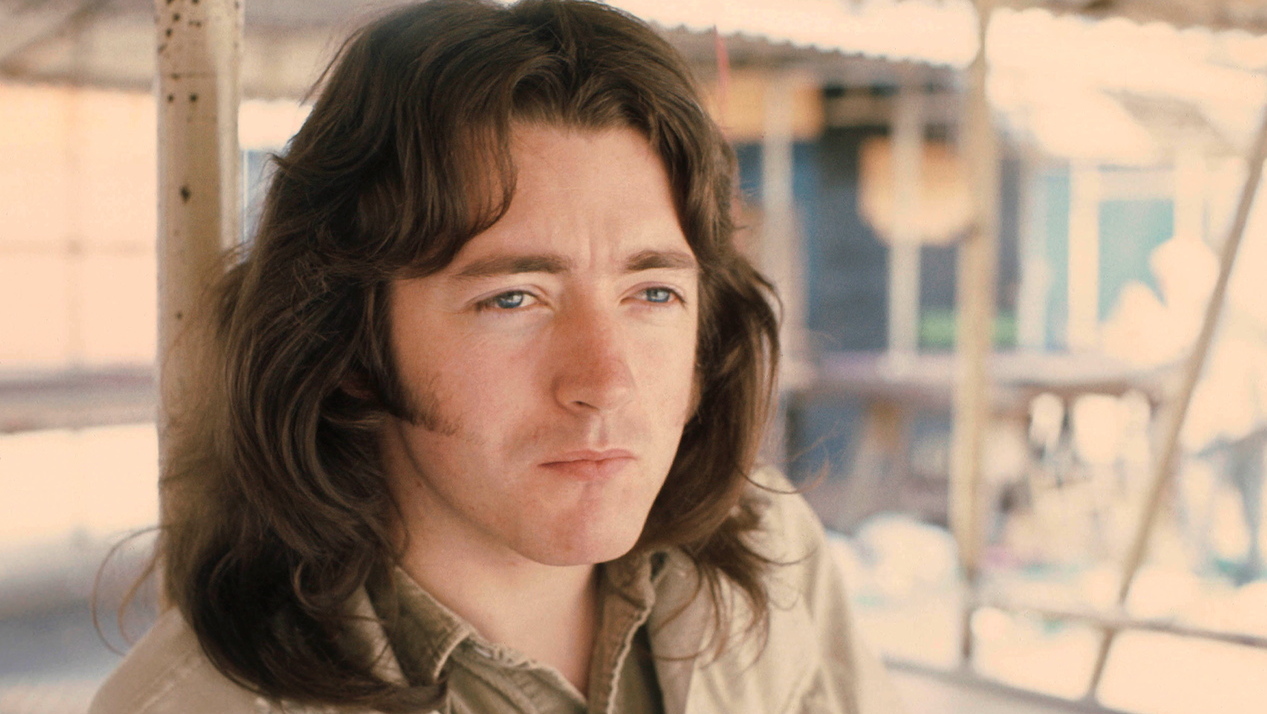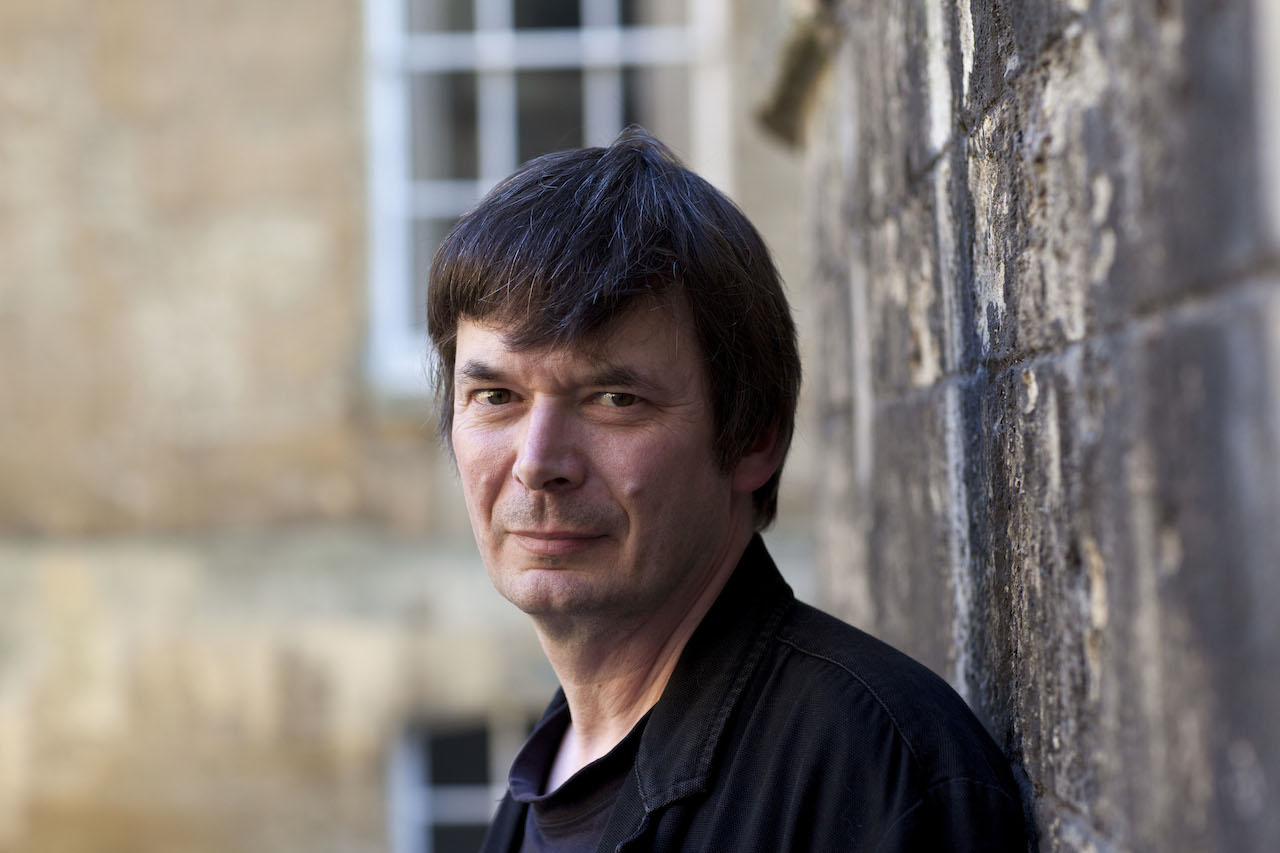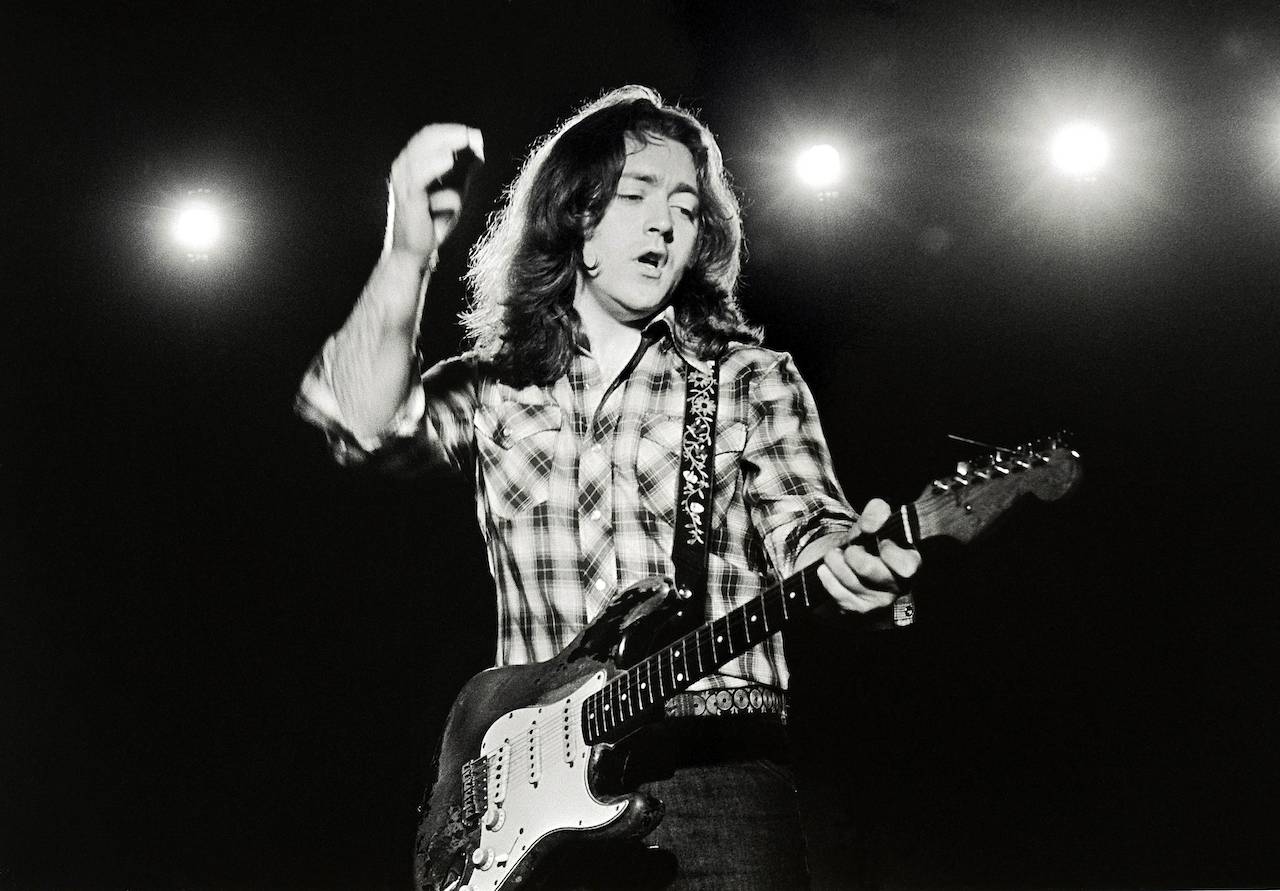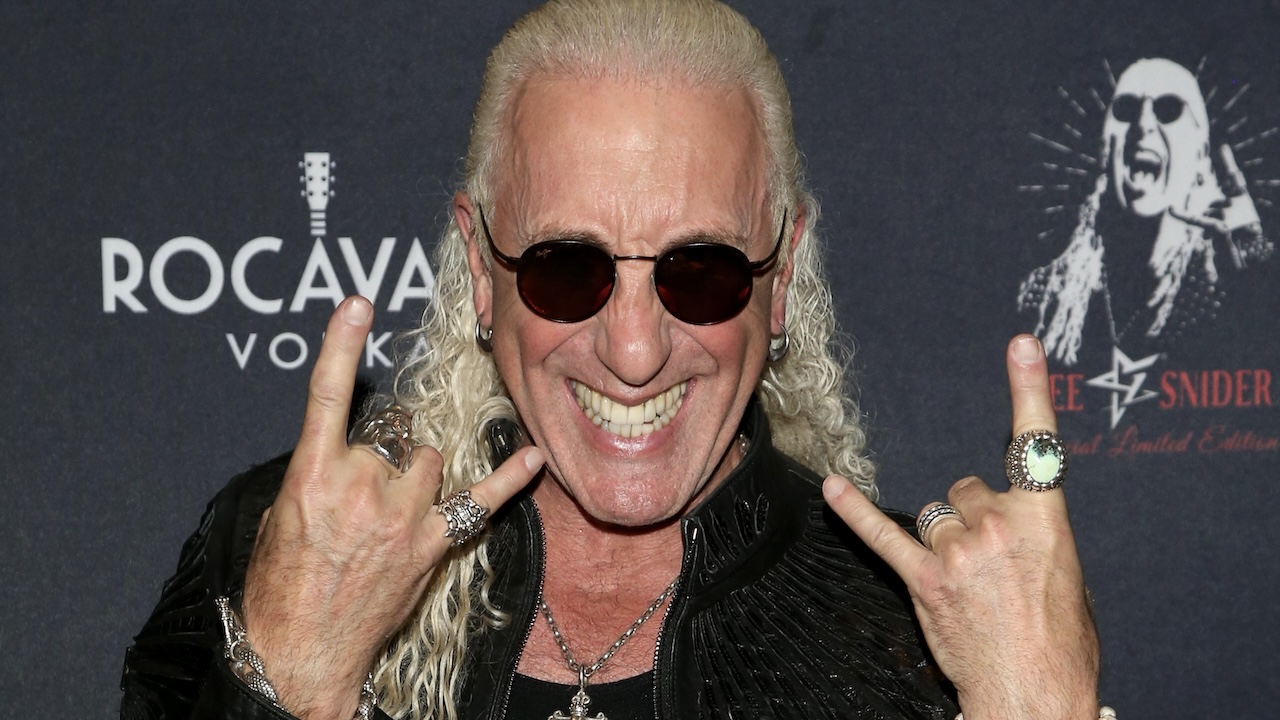How Rory Gallagher Inspired Author Ian Rankin
Fusing a whodunnit novella with Rory Gallagher’s darkest songs, Ian Rankin's Kickback City is much more than a bog-standard box-set.

Select the newsletters you’d like to receive. Then, add your email to sign up.
You are now subscribed
Your newsletter sign-up was successful
Want to add more newsletters?

Every Friday
Louder
Louder’s weekly newsletter is jam-packed with the team’s personal highlights from the last seven days, including features, breaking news, reviews and tons of juicy exclusives from the world of alternative music.

Every Friday
Classic Rock
The Classic Rock newsletter is an essential read for the discerning rock fan. Every week we bring you the news, reviews and the very best features and interviews from our extensive archive. Written by rock fans for rock fans.

Every Friday
Metal Hammer
For the last four decades Metal Hammer has been the world’s greatest metal magazine. Created by metalheads for metalheads, ‘Hammer takes you behind the scenes, closer to the action, and nearer to the bands that you love the most.

Every Friday
Prog
The Prog newsletter brings you the very best of Prog Magazine and our website, every Friday. We'll deliver you the very latest news from the Prog universe, informative features and archive material from Prog’s impressive vault.
This article first appeared in The Blues #10, November 2013
The Blues is stood in a dark alley somewhere in America, deep on the wrong side of the tracks. A cop’s flashlight flits around in the dark, dancing between dumpsters, slicing through steam, picking out the principals in this grim scene. There’s a one-time boxing champion – now some years past his prime – slumped against the wall, slurring his innocence but spattered with blood. At his feet, the youngest daughter of the city’s corporate big-wheel, her clothes stripped and her face savaged with a broken bottle. “Bloodstains on the dress of the millionairess,” notes the cop. “That’s from a song, isn’t it?”
Pinch yourself. None of this, thank God, is actually happening, but your mind plays tricks when faced with Kickback City. By this point we’ve become desensitised to press releases, so it’s easy to sneer at Sony’s blurb about a “unique immersive album”. In this case, though, they’ve got a point. This isn’t just a box set: it’s a whole murky underworld you can reach out and touch.
The backbone of the package is The Lie Factory, a 40-page film-noir Ian Rankin novella, inspired by the music of Rory Gallagher and accompanied by 21 of the Irish guitarist’s crime-related songs. Throw in graphic-novel artwork by Timothy Truman, plus a disc with actor Aidan Quinn narrating the story, and you might call Kickback City the anti-Spotify.
“It’s a beautiful object,” nods Rankin, who has rather thrillingly agreed to an interview. “A hybrid of a comic and album. It just wouldn’t have worked as a download. I like an artefact, something you can hold in your hand. Hopefully, that’s coming back again.”
This isn’t our usual gig. But then, it isn’t Rankin’s, either. Earlier this year, the wildly successful Scottish crime writer was interrupted – then intrigued – by a stranger dangling the project. “It was all down to Rory’s brother, Donal,” he explains. “He came to me and asked if I knew that Rory was a big fan of crime fiction. I didn’t, but it made perfect sense. When you think about his song titles and lyrics, it’s obvious. He died too early to get any of my books. His favourite stuff was hardboiled American urban noir. Raymond Chandler. The Big Sleep. Continental Op is the title of a Dashiell Hammett novel. Donal told me he’d open up Rory’s guitar case on tour and there’d be piles of crime fiction books in there.
“I’ve got a much better sense for Rory Gallagher as a man than I had when I started this,” adds Rankin. “Of course, Donal had a whole fund of stories and misadventures, the fun they had together. I don’t think Rory was a ‘tragic figure’, no. Only in that he died too young. Y’know, he wasn’t flagging creatively, so that’s a tragedy. It’s always grim when your musical heroes start to drop.”
Sign up below to get the latest from Classic Rock, plus exclusive special offers, direct to your inbox!
Aside from the instant kudos that Rankin’s byline attaches to Kickback City, there was another reason for Donal pursuing him. Since creating his most famous character – the hard-living Edinburgh detective Rebus – in 1987’s Knots & Crosses, the novelist has dropped countless references to the late Irish guitarist.
“I’d often have Rebus listening to Rory Gallagher,” says Rankin. “Rebus is pretty working class. He’d have been the right age to see Rory in his prime. He likes music that is authentic. You know, he likes early Who, he prefers the Stones to The Beatles, he likes a bit of blues. It just seemed to me that Rory would tick all the boxes. Good music for drinking? Yeah. I could see Rebus having a glass of malt at the end of the night, listening to a live Rory Gallagher album.”

By extension, Rankin himself was a fan. “In my teenage years, from about 1972 onward,” he nods, “when somebody at school loaned me their copy of Live Taste. I had one opportunity to see Rory live as a teenager. There was a bus-load of us who came to Edinburgh. Half of us were going to see Genesis, post-Peter Gabriel, and the other half were going to see Rory Gallagher. Basically, I made the wrong decision. So I went off to see Genesis. I’ve always regretted that.”
He cites his interests on Twitter as “beer and rock music”, and you sense that Rankin enjoys being asked about his record collection for a change, instead of another high-brow probing from Literary Review. “Like most crime writers that I know,” he admits, “I would much rather be a successful musician than a successful writer. Whenever there’s a book festival on, if you go to the nearest bar, that’s where you’ll find the crime writers, all talking about music.
“Which novelist do I think would make a good rock star? Er… Will Self.”
Are there parallels between novelists and rock stars, then?
“We wish!” Rankin chuckles. “I mean, writers don’t become writers because they’re public performers. We’re happier in a room on our own, with our laptops, playing with our imaginary friends. I was once the singer in a very unsuccessful punk band for six months. We did five gigs and sent a tape to John Peel, who never played it. The Stones are probably my biggest band. There’s a certain period, from the mid-60s to the early-70s, the great albums like Beggars Banquet, Let It Bleed, Sticky Fingers, Exile On Main St – just absolutely in their prime. I hated Let It Bleed when I first heard it, aged 11. Just thought it was a racket. Now, it’s my favourite album of all time. For me, it was always the Stones over The Beatles. I’d much rather listen to Let It Bleed than Revolver…”
The Stones are sort-of-bluesy, of course. But did you go deeper?
“I had a few John Lee Hooker, Howlin’ Wolf and BB King albums,” says Rankin. “But I’ll tell you what got me back into the blues. My son, Jack, when he was 14, he started playing guitar and he immediately went to the blues. He was teaching me, taking me right back to the 1920s. He got me into blues in a way I don’t think would have happened otherwise. Whenever I went to the States, he would give me a list of albums to come back with. I’m looking at one now. A box set from Arhoolie, Hear Me Howling!. Some incredible people on it. Y’know, the Reverend Louis Overstreet… he sounds like a character from the book.”
Let’s get back to the book, then. Without spoiling The Lie Factory’s devilish twist, the set-up concerns a society beauty, one Agatha Dempsey, murdered by a gone-to-seed boxer (Kid Gloves) in the alleyway behind a dive-bar named Camille’s Lounge. With the unfolding events seen through the heavy-lidded eyes of the private investigator Regan, the text references various Rory Gallagher tracks – Loanshark Blues, Slumming Angel, Sinner Boy – which also appear on the CD. And if that sounds a little contrived in concept, it’s pretty seamless in practice.
- Charlie Watts: a drummer’s guide to surviving the Rolling Stones
- 10 Music Books Every Rock Fan Should Read
- The rise and acrimonious fall of Rory Gallagher's Taste...
- Rory Gallagher On The Road in ’72
“We came up with this idea of doing a story in the style Rory would have appreciated,” says Rankin. “A kind of homage to the golden age of the American detective story. So there would be a private eye, a femme fatale, a loan shark. And if it’s a private eye story, it’s got to be written in the first-person. So I was being asked to do something I’d never done before: to write with an American voice. It was a challenge. I thought, ‘Can I do this? Can I actually write an American private eye story?’ But it’s a risk you can take with a short story. Whereas with a novel, after six months, if you’ve screwed it up, you’ve wasted a lot of your life.
“The further challenge was to namecheck Rory’s crime-themed songs,” he adds. “Donal said, ‘Well, here’s a couple of dozen songs we could start with’. I just went through the lyrics and picked out little bits and pieces that I thought might form the spine of the story. So you’ve got the boxer, that’s the song Kid Gloves. You’ve got a blackmailing loan shark, that’s Loanshark Blues. You’ve got the rich young woman slumming it, so you get Slumming Angel. And so on.”
Nobody ever really talks about Rory’s prowess as a lyricist. As a writer who’s sold some 30 million copies of the Rebus books, how does Rankin rate him?
“Being a fan of Rory, I tended to focus on the guitar and the very raw, passionate vocals, not really the lyrics,” admits Rankin. “The other thing is, if you buy a Rory album, a lot of the time, you don’t get the lyrics with it, as though he was almost embarrassed by them. But when I went back through, there are some really strong lyrics and a lot of good one-liners. I actually quote one lyric in the story, you know, ‘bloodstains on the dress of the millionairess’ [from Continental Op]. That’s a great line. It forms a picture, and you start asking yourself, ‘Well, whose blood is it, and how did a rich woman get involved?’”
Over on the story disc, Quinn’s drawled narration is pitch-perfect, evoking feet-on-desk private dicks chain-smoking in seedy offices. “He’s definitely got the voice,” agrees Rankin, “and he got into the characters as well. Hearing your words being read by a proper Hollywood actor, it just came alive for me, almost like you’re in a movie. Especially if you’re listening to it while flipping through the book, looking at some of the artwork.”
He’s right: Truman’s artwork brings a brilliant visual dimension to the project, punctuating the pages of The Lie Factory with Rory references.
“Comic books were the first things I ever read,” says Rankin. “That was all I could afford as a kid. So it was Batman, Superman, plus all the British comics. I’d seen some of Tim’s work, and I just thought, yeah, this’ll be great.
“Even now, I’m holding the cover up and it looks like Frank Miller’s Sin City. You kind of feel like this is an American urban environment, but it’s almost like steampunk: it could be the future. Tim also got a few nice in-jokes in there. There’s a Rory Gallagher guitar in the background of one of the panels, and at the back you’ve got a flyer for ‘Rory Gallagher, The New Guitar Sensation!’, playing at Camille’s Lounge – and one of the characters is the promoter.”
It’s a little unsettling how much The Blues is enjoying all this. In the real world, of course, most of us avoid the proverbial dark alleys and would be sickened and saddened by the discovery of a mutilated woman. So what is it about human nature that draws us to the dark side in fiction?
“Well, it’s like, why do people like the blues?” asks Rankin. “The blues is about as dark as music gets, and classic crime fiction has got the same things you find in the blues. You’ve got disappointed people, you’ve got love gone wrong, you’ve got one mistake changing your whole life. The blues is full of murder, full of jealousy and rage, y’know, very basic human emotions. I think those basic human emotions get to us, as listeners, listening to the blues – and they get to us as readers when we read crime fiction.”
Ultimately, then, Kickback City is escapism. No doubt, there will be cynics and dullards who decide its handfuls of paraphernalia and £20 price-tag overegg the pudding, but at a time when most rock’n’roll is consumed as a file via iTunes, this one-off release might just jolt jaded veteran music fans out of their stupor. Just as important, Rankin reminds us, is that it keeps Rory’s fire burning.
“Of course, it was a way of paying homage to the man himself,” says the novelist, “and making sure that his voice isn’t lost. Whether people come to this box set because they’re fans of my books or fans of graphic novels – it makes no difference. Hopefully, it could build a new audience for Rory Gallagher.”

Henry Yates has been a freelance journalist since 2002 and written about music for titles including The Guardian, The Telegraph, NME, Classic Rock, Guitarist, Total Guitar and Metal Hammer. He is the author of Walter Trout's official biography, Rescued From Reality, a music pundit on Times Radio and BBC TV, and an interviewer who has spoken to Brian May, Jimmy Page, Ozzy Osbourne, Ronnie Wood, Dave Grohl, Marilyn Manson, Kiefer Sutherland and many more.

